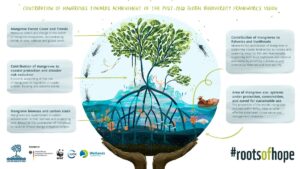Introduction
Forests are more than just a collection of trees. They are intricate ecosystems that play a vital role in sustaining life on Earth. As we move through 2024, the economic benefits of protecting forest ecosystems are becoming increasingly evident, underscoring their importance in sustainable development and biodiversity conservation. This article delves into the economic advantages of preserving these vital ecosystems, illustrating how sustainable forest management not only supports environmental health but also boosts economic growth and community well-being.
1. Forest Ecosystems: A Pillar of Sustainable Development
Forests are integral to achieving sustainable development goals (SDGs). They provide essential services such as carbon sequestration, water filtration, and soil conservation. These ecosystem services are crucial for maintaining environmental stability and supporting human livelihoods.
- Carbon Sequestration: Forests act as carbon sinks, absorbing carbon dioxide from the atmosphere and mitigating climate change. According to recent studies, forests sequester approximately 7.6 billion metric tons of CO2 annually. This role is increasingly vital as global carbon emissions rise. Protecting forests can significantly reduce the costs associated with climate change mitigation and adaptation.
- Water Resources: Forests play a critical role in regulating water cycles. They maintain watershed health by filtering pollutants and controlling runoff. This function reduces the need for expensive water treatment infrastructure and minimizes the risk of water scarcity.
- Soil Conservation: Forest ecosystems prevent soil erosion by stabilizing the soil with their root systems. This prevents land degradation and maintains agricultural productivity, saving costs on soil restoration and agricultural inputs.
2. Economic Contributions of Forest Ecosystems
Forests contribute directly to the economy through various sectors, including timber production, tourism, and non-timber forest products. Their economic value extends beyond these industries, impacting local and national economies.
- Timber and Non-Timber Products: The forestry sector generates substantial revenue from timber and non-timber forest products (NTFPs). In 2024, global forest product trade is estimated to be worth over $500 billion. Sustainable forestry practices ensure that timber production does not compromise forest health, leading to long-term economic benefits.
- Tourism: Ecotourism is a rapidly growing sector that relies on healthy forest ecosystems. National parks and protected areas attract millions of visitors annually, generating revenue for local communities and governments. In 2024, the global ecotourism market is projected to exceed $300 billion. Forest-based tourism also creates jobs and supports local businesses.
- Non-Timber Forest Products: Forests provide a wide range of NTFPs, such as fruits, nuts, medicinal plants, and resins. These products contribute significantly to local economies, especially in rural areas where forest resources are a primary source of income.
3. Biodiversity and Ecosystem Services
Biodiversity is a key component of forest ecosystems, and its preservation has profound economic implications. Diverse ecosystems are more resilient and better equipped to provide essential services.
- Ecosystem Resilience: Biodiversity enhances the resilience of forest ecosystems to environmental changes and disturbances. This resilience reduces the risk of ecosystem collapse and the associated economic costs of restoring damaged systems.
- Pollination Services: Forests support a wide range of pollinators, including bees, butterflies, and birds. These pollinators are crucial for agricultural productivity, contributing billions of dollars annually to global food production. Protecting forests helps maintain healthy pollinator populations, ensuring the continued availability of food resources.
- Medicinal Resources: Many pharmaceutical products are derived from forest plants and organisms. Biodiversity loss can limit the availability of these resources, impacting the pharmaceutical industry and public health. Conserving forests safeguards these valuable medicinal resources.
4. The Cost of Deforestation
Deforestation and forest degradation come with significant economic costs. The destruction of forest ecosystems leads to the loss of valuable services and resources, with far-reaching consequences for both local and global economies.
- Economic Losses: The Global Forest Resources Assessment estimates that deforestation costs the global economy approximately $2.5 trillion annually. This figure includes the loss of ecosystem services, reduced agricultural productivity, and increased climate-related costs.
- Social Impacts: Deforestation disproportionately affects indigenous and local communities who depend on forests for their livelihoods. The economic displacement and loss of cultural heritage result in social and economic instability.
5. Strategies for Sustainable Forest Management
To maximize the economic benefits of protecting forest ecosystems, it is essential to implement effective sustainable forest management strategies. These strategies balance conservation with economic development, ensuring that forests continue to provide vital services and resources.
- Certification Programs: Forest certification programs, such as those offered by the Forest Stewardship Council (FSC), promote sustainable forestry practices. Certified forests are managed to meet environmental, social, and economic criteria, ensuring long-term sustainability.
- Community Involvement: Engaging local communities in forest management fosters stewardship and supports livelihoods. Community-based forest management initiatives empower local populations to participate in decision-making processes and benefit from forest resources.
- Reforestation and Afforestation: Investing in reforestation and afforestation projects helps restore degraded lands and expand forest cover. These initiatives contribute to carbon sequestration, biodiversity conservation, and economic development.
Conclusion
The economic benefits of protecting forest ecosystems are substantial and multifaceted. Forests play a critical role in sustainable development, providing essential ecosystem services, supporting economic sectors, and preserving biodiversity. As we progress through 2024, recognizing and enhancing these benefits is crucial for promoting long-term environmental health and economic prosperity. By investing in sustainable forest management, we can ensure that forests continue to support both people and the planet for generations to come.



